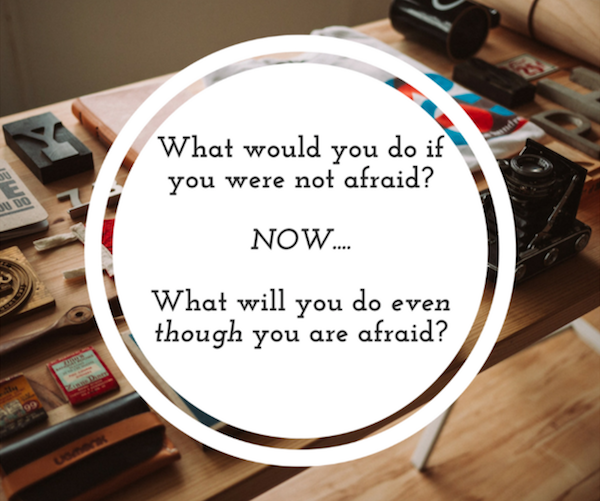The appearance of a lack of confidence has consequences.
A Harvard Business School study found that one of the most common reasons managers cite for not promoting women is that they didn't appear confident enough to do the job . . . not competent, confident. So, they thought we could do the job, but didn't think we believed we could do it! Mel Robbins talks about this phenomenon in
this insightful video for Success Magazine. Lack of confidence—or the appearance of such—has a material impact on your career.
Here's another interesting angle. When it comes to applying for jobs, women are much less likely to bother applying if they don't think they are 100% qualified for the position. If a man believes he has 60% of what the job requires, he'll go for it; yet most women need to believe they have 100% of the skills required to go for it. 100%! In my mind, that 100% qualification doesn't leave much room for growth or on-the-job training (which, for me, is the best way to learn!).
There is a double-standard at play here. Women are often expected to take on new roles and responsibilities before they are considered for the new job or promotion, and we perpetuate that by our desire to be 100% ready. For men, this expectation doesn't exist.
Let's challenge this paradigm; apply for that job or the promotion even if you don't have 100% of the skills required! Get comfortable learning on the job, and it will accelerate your career growth.
This article by
Tara Mohr talks about the stats around this. She does not see this as a confidence issue, but I respectfully disagree (I'm a huge fan of Tara Mohr, so this is not easy for me to do).
I believe that if we were generally more confident in our abilities, we would not be so easily deterred from applying for jobs that we are less than 100% "qualified" for!
Millennials—who are often unfairly maligned as being "too confident"—there is something in this article for you too. Even if you have all the confidence in the world, how you communicate impacts how you are perceived.
While companies have some work to do in how they work with you, you can improve your success and comfort at work by taking some steps towards being a more self-reliant speaker.
So, What to Do? How to Be Confident?
Confidence is something we all can learn. Some are born with it, some acquire it over time, and some of us actively work on it. I firmly believe that knowing yourself leads to more confidence. I always encourage people to start with VIA Character Strengths.
This free test assesses you on 24 character strengths that are central to all cultures, all geographic regions, and all people. Their researchers dug into 2,500 years of documentation and recognized emerging themes.
The 24 strengths showed up over and over again, proving themselves to be universal. So it doesn't matter where you live, what your financial status is, what your cultural background is: this test is relevant to all of us.
The test results you get are the 24 strengths in rank order for you, from your "Signature" strengths to your lesser strengths. Once you take the test and have your results, you may have a lot of questions; you may not even like your results. Working with a coach who is knowledgeable in VIA can help you make sense of it and learn how to apply your strengths in life. When you approach your world from a place of understanding what your superpowers are, you are unstoppable!
Can I Fake It 'till I Make It?
I'm not a huge fan of this phrase; I prefer "acting as if." Maybe that's just semantics. What do I mean by "acting as if"? I mean your space and use your voice—your authentic voice. Don't be afraid to speak up, even if you're not 100% certain. Think about how you wish to be perceived, and then act that way . . . Act as if that is who you already are. Before you know it, it will be who you are, and you won't be acting anymore!
Is this faking? Well, that depends. Do you want people to perceive you as you are? If your answer is yes, then go for it! If your answer is no, then I humbly suggest that you do some work on yourself. If you don't like who you are, how can you expect to garner the respect of your colleagues? If you don't like who you are, don't change who you are; change how you feel about yourself!
 Effective Communication Skills
Effective Communication Skills
Another key to confidence and how you are perceived is how you communicate. Even if you feel confident, your communication impacts how you come across to your co-workers. Do you use persuasive speech? Are you able to articulate what your vision is, what you want, and get your point across?
Did you know that a significant element to effective communication is active listening? If you can hear what matters to those you wish to influence and reflect on them in conversation, you can find ways to be heard. Listening to others helps you come up with good questions to ask, which is as important for effective communications as what you say and how you say it!
This is hugely important in all relationships, not just work ones. Imagine how your confidence could grow if you were able to not only have your voice heard but also make meaningful contributions to the conversations around you. You become part of the strategy at work because you "get it." I can't stress the value and importance of this enough. So, stop second-guessing yourself and speak up.
 Speaking up with confidence
Speaking up with confidence
I know, easy for me to say. However I, like many others, have had a fear of public speaking for most of my life. For some, that fear keeps us quiet even in meetings. It's hard to appear confident if we can't speak up when needed.
Picture someone you admire. Now, think about their communication style. Is it easy, natural, effective? Do their words flow effortlessly or do they struggle to articulate their ideas? Do you suppose they were always so eloquent or did they too have a hard time with this? My bet is the latter. Most people are not naturally great speakers. They learned those skills along the way, whether organically or through communication coaches and guided practice.
One of the ways that many people learn the art of speaking is with public speaking classes like
Toastmasters. They are an organization dedicated to strengthening public speaking and growing leadership skills. Whether your goals and dreams take you to the boardroom or non-profits, to finance or the arts, learning to have your voice heard and communicated with ease is a worthy skill to learn.
There are Toastmaster clubs all over the world, so wherever you are, there is likely a local chapter near you. Most allow you to attend at least one or two meetings as a guest so you can check and see if they seem right for you. Membership costs are low, and the benefits are immeasurable!
What's Next?
There is a natural ebb and flow to confidence as we progress through life. I write about that in my blog so won't repeat myself too much here. Instead, I
strongly encourage you to read this article. In it, I talk about the confidence we start with at children, the "teenage bravado" that we wear, and the ups and downs our confidence takes throughout our lives.
The bottom line is that you can establish and maintain a healthy level of confidence through all phases of life, but for most of us it takes work. It's so worth it though. I can tell you firsthand that having had a lot of confidence, only to have it dashed by bad bosses and crappy jobs, is not a fun journey. I have worked on rebuilding it and know that I am on the rock-solid ground. Some of what helped me build my confidence:
- Understanding and embracing my strengths and what I bring to the table.
- Learning to listen more closely, and incorporating what I hear into the conversation. This helps position me as an integral part of the team or project.
- Learning to speak more confidently, enabling me to get my point across, to be more strategic.
- If you build a strong foundation for yourself, you can weather the lows, revel in the highs, and always make the best decisions for you, which is what we should all strive for!
People often remember Ciara for her shock of red hair. What she wants you to remember is how she helps professionals like you understand and appreciate their superpowers: their unique strengths and gifts. She wants to teach them to see their value and what they bring to the world and to revel in it.
Ciara's passion is helping her clients attain the life they want, on their terms. She helps them to find their voice, deal with the "mean girl" in their head, and gain meaningful insight into themselves. Her clients learn how to prioritize in their work and home lives, how to be recognized as strategic members of their teams, and how to take their rightful place in the world!
Ciara attained her master professional life coach certification at a well-regarded coach training school, Impact Coaching Academy, learning the skills that have helped thousands of people just like you. She is also a Huffington Post Contributor, writes for Thrive Global, is a change.org petitioners coach, and has been a feature on Women You Should Know. All of this, over 20 years of analytical experience in technology, can help you to make real, positive change in your life.
Opinions expressed by the author are not necessarily those of WITI.
Are you interested in boosting your career, personal development, networking, and giving back? If so, WITI is the place for you! Become a WITI Member and receive exclusive access to attend our WITI members-only events, webinars, online coaching circles, find mentorship opportunities (become a mentor; find a mentor), and more!
Founded in 1989, WITI (Women in Technology International) is committed to empowering innovators, inspiring future generations and building inclusive cultures, worldwide. WITI is redefining the way women and men collaborate to drive innovation and business growth and is helping corporate partners create and foster gender inclusive cultures. A leading authority of women in technology and business, WITI has been advocating and recognizing women's contributions in the industry for more than 30 years.
The organization delivers leading edge programs and platforms for individuals and companies -- designed to empower professionals, boost competitiveness and cultivate partnerships, globally. WITI’s ecosystem includes more than a million professionals, 60 networks and 300 partners, worldwide.
WITI's Mission
Empower Innovators.
Inspire Future Generations.
Build Inclusive Cultures.
As Part of That Mission WITI Is Committed to
Building Your Network.
Building Your Brand.
Advancing Your Career.



Comments